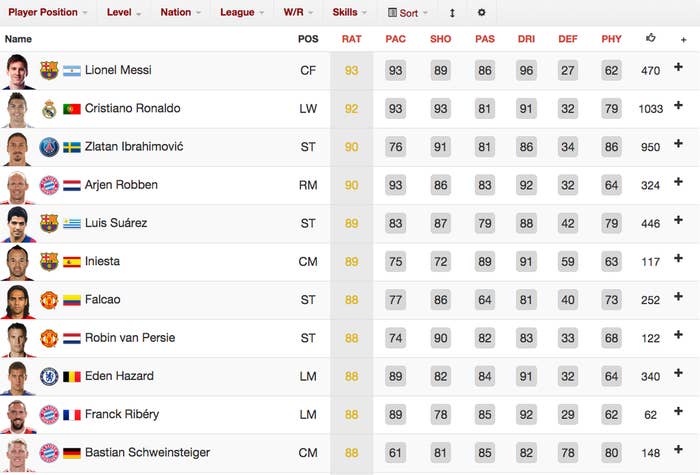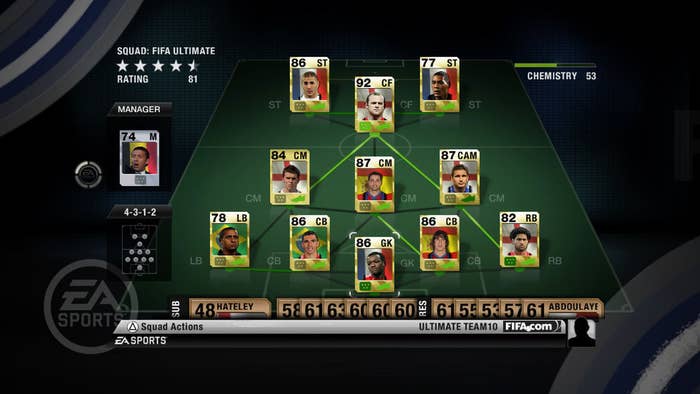
In 2010, Dan Paulson and Chris Conover were working as web developers in Orlando when they picked up a copy of EA Sport's FIFA 11. Neither had really played the series before, or had any special interest in soccer, but they quickly found themselves hooked.
Just three years later, they run a major website dedicated to the game, FutHead, which attracts millions of visitors each month and which made them over a million dollars when they sold it last year to Curse, an online game portal.
The success of FutHead is obviously a testament to FIFA's status as the world's most beloved sports videogame series. But more specifically, it's part of the story of the explosive success of FIFA's five-year-old Ultimate Team mode (or FUT), a wildly popular, yet largely unknown to most form of online fantasy fùtbol in which players wheel and deal their way to squads comprised of better and better (real) players.
Over 20 million people have signed up for Ultimate Team since its inception, and the release tomorrow of FIFA 15 will only see that number grow. Many of those people pay real money to acquire FIFA Points, which can then be exchanged for player packs, much like a pack of baseball or Magic cards. Earlier this year, EA announced that their Ultimate Team services, which they introduced with FIFA, generated $380 million dollars in revenue for the fiscal year.
The key to the appeal of FUT, like any collectibles-based community, is its weekly updates, in which EA release special improved versions of players who are "on form" in real life, which go on sale in packs. Put simply, if Barcelona star Neymar scores four goals in a week, for example, EA might release an updated—and rare—version of him with improved statistics.
Because of its constant iterations, daunting number of players from all leagues around the world, and obsessive focus on value, Ultimate Team rewards careful attention and comparison, something that is impossible without a complete catalog of players. In 2011, when Paulson and Conover started playing Ultimate Team, that didn't exist. Paulson, who grew up playing World of Warcraft and was accustomed to that game's comprehensive online databases (like Wowhead and UltimateDB), was shocked FUT didn't have an equivalent.
"Any game as big as FIFA should have a canonical source for information," Paulson said.

So he and Conover decided to make it. It took the two college friends a month of work in their spare time to build the first FutHead database, but as soon as the site went live, they knew they had a hit on their hands.
"The first day after we were accepted to Google Ads we made 500 bucks. We said to each other, 'this could be something.'"
FutHead had stumbled upon a hidden—and massive—audience. So quick were FIFA fans to flock to the site that the major issues faced by Paulson and Conover in the early days of the site were entirely technical.
"It was painful when the site took off," Paulson said. "We were restarting and adding servers every day. There was a lot of on the job training."
But the site continued to grow—and grow. When Curse acquired FutHead in June 2013, the site was averaging around 90 million pageviews a month. This past May, FutHead attracted 420 million pageviews, more than quadrupling their popularity in a year.
Given Futhead's massive audience, it's natural to wonder why EA didn't build it first, and why they haven't tried to build a competitor. Paulson attributes it to a lack of technical expertise: "They want something like this but they don't have the chops to do it. They can barely keep their blog running."
For their part, Paulson and Conover maintain a strategic relationship to stay on EA's good side; they won't run ads for coin selling operations, users who use bots to farm Ultimate Team's in game currency and sell it on third party networks. In exchange, FutHead get data on new player cards from EA in advance of their release.
If there's a threat to FutHead, in fact, it probably doesn't come from EA, which gains publicity for its game, but from FIFA, to whom FutHead don't pay licensing fees and from whose players FutHead profits. Paulson says he and Conover's decision to sell to Curse was largely motivated by concerns about liability.
For the time being though—and with the release of tomorrow's game—the site is popular, profitable (with a paid staff of just the two friends), and proof of the huge and growing community of FIFA fanatics throughout the world, one–like the other emergent game communities—with a potentially enormous future economic footprint
Said Paulson, "I wouldn't be a soccer fan if it wasn't for the game."
